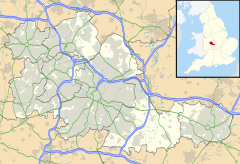| West Bromwich | |
|---|---|
 | |
Location within the West Midlands | |
| Population | 103,112 [1] |
| OS grid reference | SP0091 |
| • London | 126 mi (203 km) |
| Metropolitan borough | |
| Shire county | |
| Metropolitan county | |
| Region | |
| Country | England |
| Sovereign state | United Kingdom |
| Areas of the town | List
|
| Post town | WEST BROMWICH |
| Postcode district | B70, B71 |
| Dialling code | 0121 |
| Police | West Midlands |
| Fire | West Midlands |
| Ambulance | West Midlands |
| UK Parliament | |
West Bromwich (/ˈbrɒmɪtʃ/ BROM-itch), commonly known as West Brom, is a market town in the borough of Sandwell, in the county of the West Midlands, England. Historically part of Staffordshire, it is 7 miles (11 kilometres) northwest of Birmingham. West Bromwich is part of the area known as the Black Country, in terms of geography, cultures and dialect.[2] West Bromwich had a population of 103,112 in the 2021 Census.[1]
Initially a rural village, West Bromwich's growth corresponded with that of the Industrial Revolution, owing to the area's natural richness in ironstone and coal, as well as its proximity to canals and railway branches.[3] It led to the town becoming a centre for coal mining, brick making, the iron industry and metal trades such as nails, springs and guns. The town's primary economy developed into the engineering, manufacturing and the automotive industry through the early 20th century.[4] During the Second World War, West Bromwich experienced bombing from the German Luftwaffe.[5][6] It also suffered heavily during recessions in the mid 1970s, early 1980s and late 2000s.[7]
The town is known for its football club West Bromwich Albion, who have played in the town since the club's formation in 1878.[8] It is also home to parts of Sandwell Valley Country Park and Sandwell Valley RSPB nature reserve.[9]
- ^ a b "West Bromwich (West Midlands, West Midlands, United Kingdom) – Population Statistics, Charts, Map, Location, Weather and Web Information". citypopulation.de. Retrieved 10 April 2023.
- ^ "What and where is the Black Country?". BBC. Retrieved 19 September 2019.
- ^ "West Bromwich Staffordshire". Vision of Biritain. Retrieved 19 September 2019.
- ^ "West Bromwich: Economic history". British History Online. A P Baggs, G C Baugh and Johnston D A, 'West Bromwich: Economic history', in A History of the County of Stafford: Volume 17, Offlow Hundred (Part), ed. M W Greenslade (London, 1976), pp. 27-43. Retrieved 19 September 2019.
- ^ "West Bromwich Blitz 1". West Bromwich Local History Society. Retrieved 19 September 2019.
- ^ "Bomb Damage: West Bromwich at War 1939-45". West Bromwich Local History Society. Retrieved 19 September 2019.
- ^ "Recession hits West Midlands hard". BBC. 23 January 2009. Retrieved 19 September 2019.
- ^ "West Bromwich". Encyclopædia Britannica. Retrieved 19 September 2019.
- ^ "All about Sandwell Valley Country Park". Sandwell Metropolitan Borough Council. Retrieved 19 September 2019.
